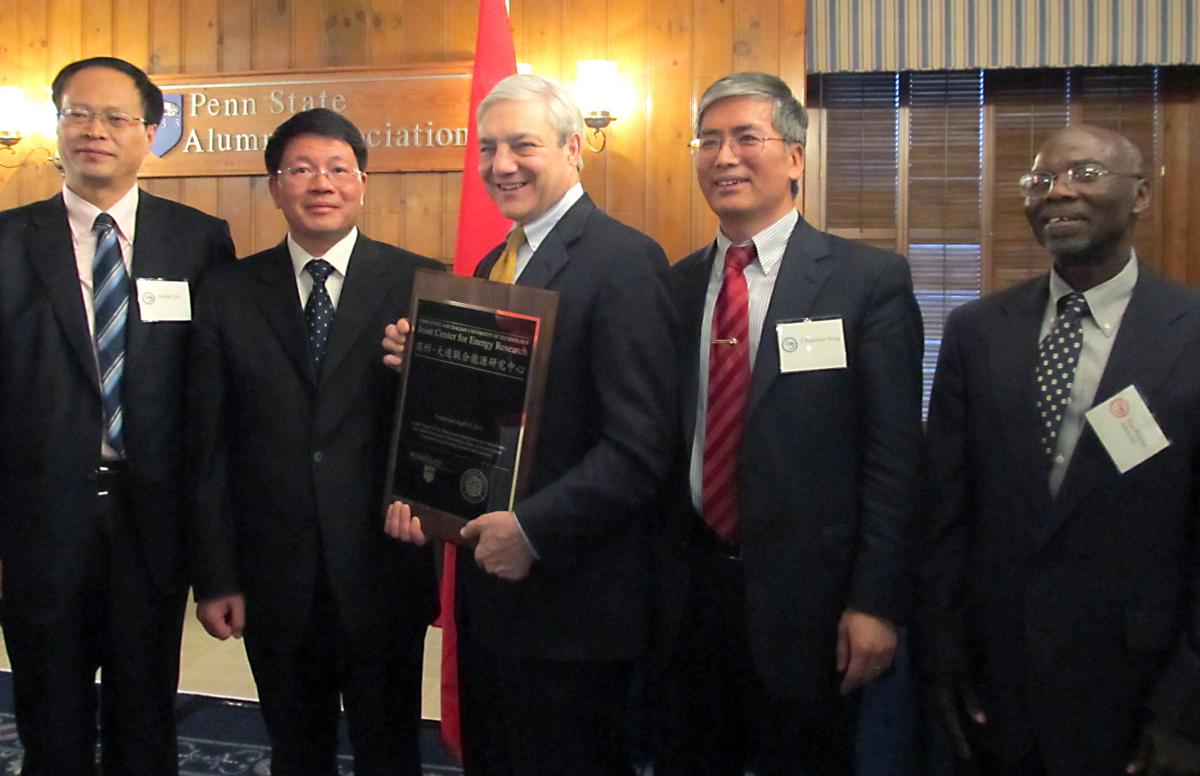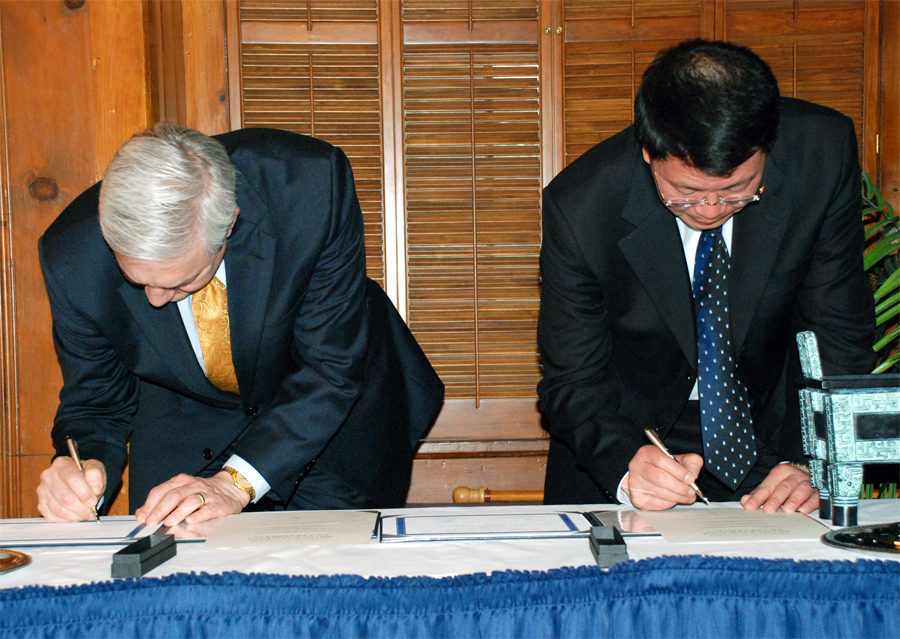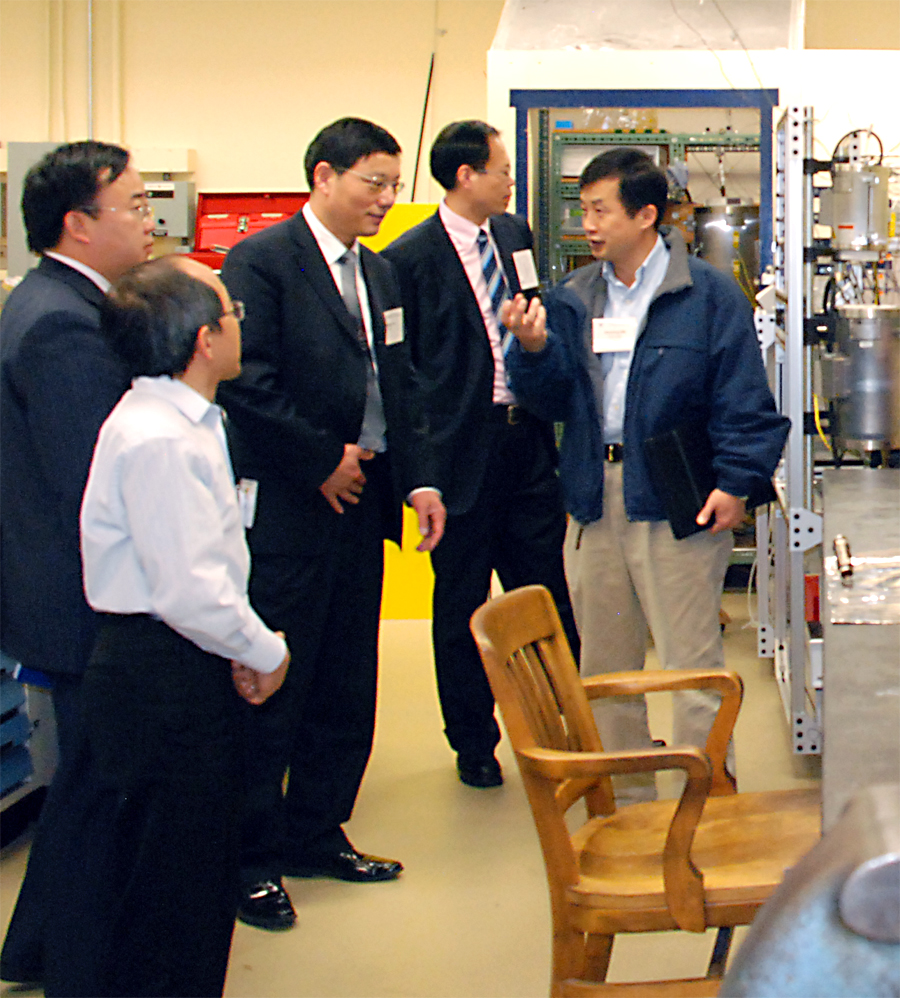On April 12, Penn State and Dalian University of Technology (DUT) in China celebrated the establishment of the Penn State – Dalian Joint Center for Energy Research (JCER). Ceremony attendees included Penn State President Graham Spanier, Penn State Vice President for Research Henry Foley, Penn State Vice Provost Michael Adewumi, State College Mayor Elizabeth Goreham, DUT President Jinping Ou, DUT Vice President Guiling Ning and many other faculty and staff members from both universities.

From left to right: JCER co-director from DUT Jieshan Qiu, DUT Presidient Jinping Ou, Penn State President Graham Spanier, JCER codirector from Penn State Chunshan Song, and Penn State Vice Provost Michael Adewumi with the plaque commemorating the new Center.
The JCER aims to facilitate collaborative and multi-disciplinary research in energy sciences and technology. In addition, the center will serve as a hub for innovative research and global education and provide an institutional umbrella for interacting with industry, the U.S. and Chinese governments, and local communities in the area of clean energy.
“The Joint Center for Energy Research provides great opportunities to better address critical issues in contemporary science and technology development, and help connect Penn State faculty and students to their counterparts in China,” said Penn State President Graham Spanier.
Chunshan Song, director of the EMS Energy Institute and Distinguished Professor of Fuel Science, and Jieshan Qiu, associate dean for DUT faculty of chemical and environmental technology, will co-direct the Center. The EMS Energy Institute at Penn State will coordinate the JCER activities, including faculty and student exchanges and collaborations.
“The collaboration between faculty and students at Penn State and DUT will help to solve critical energy problems important for both U.S. and China,” said DUT President Ou.

Penn State President Graham Spanier and DUT President Jinping Ou sign the official documents establishing the JCER.
The initial areas of collaboration include clean coal utilization, catalysis for chemicals and clean fuels, carbon dioxide (CO2) capture, CO2 conversion to fuels, bio-energy, water treatment, fuel processing for bio-fuels, computational energy research, carbon materials, characterization of materials, and energy economics.
The ceremony, which was followed by a musical performance and banquet, also celebrated the opening of the Confucius Institute at Penn State. The Confucius Institute is a collaboration between Penn State and DUT to promote the study of Chinese language, culture, and research on China not only at Penn State, but also in local K-12 schools. The Confucius Institute is led by Eric Hayot, director of the Asian Studies Program in the College of Liberal Arts, and Xiaochun Niu, associate professor of the school of foreign languages and deputy director of the international office at DUT.
While academic leaders from Penn State and DUT came together to kick off the official opening of the JCER, this event also served as the second Penn State – Dalian Joint Energy Workshop. Penn State and DUT have an ongoing relationship and many existing cooperative efforts between faculty members. The establishment of the JCER will allow the universities to formalize and expand on these collaborations and promote the exchange of faculty and students.

Xiaoliang Ma, senior research associate at the EMS Energy Institute, (right) discusses the equipment in an Institute lab with DUT visitors.
The second PSU–DUT Joint Energy Workshop, which was held at the EMS Energy Institute, provided an opportunity for faculty from both institutions to come together and talk about their expertise with the goal of finding areas of mutual interest for collaborations. Participants included faculty members in multiple colleges from both Universities.
DUT President Ou gave brief remarks encouraging the collaborative energy research and thanking Penn State faculty members for their participation, and Qiu gave a presentation on DUT’s energy research areas. Next Song provided an introduction of the JCER and some general information about the EMS Energy Institute, and Tom Richard, director of the Penn State Institutes of Energy and the Environment (PSIEE), gave an overview of energy and environmental research areas at Penn State.
From Penn State, Andrew Zydney, department head of Chemical Engineering; Bruce Logan, director of the Hydrogen Energy Center; Yaw Yeboah (represented by Semih Eser), department head of the John and Willie Leone Family Department of Energy and Mineral Engineering, and John Yen, director of Strategic Initiatives, College of Information Science and Technology briefly introduced their units with respect to research and education. From DUT, Xinwen Guo, dean for DUT School of Chemical Engineering; Haoquan Hu, associate dean of the DUT School of Chemical Engineering; and He Guo, associate dean for DUT School of Software Engineering introduced their units and briefly mentioned some possible areas for future collaboration.
After the speakers, guests from DUT participated in a tour, led by Bruce Miller, associate director of the EMS Energy Institute, of the Institute laboratories. Workshop attendees then spent time discussing key issues and action items for the JCER.
The collaboration between Penn State and DUT began as the result of discussions in October 2008. In October 2009, a delegation from DUT visited Penn State and the EMS Energy Institute to discuss the establishment of a Joint Energy Research Center. During the visit, DUT and Penn State leaders signed a Memorandum of Understanding (MOU) agreeing to develop a Joint Energy Research Center. In October 2010, Penn State and DUT held their first joint energy workshop at DUT.
DUT is one of the top national universities in China with strengths in various engineering fields and business management, especially in the fields of Chemical Engineering (including Energy Chemical Engineering), Mechanics, Civil Engineering, Mechanical Engineering, Mathematics, Environmental Engineering, and Management, and has strong research in energy and environmental areas and chemical engineering. The university has over 40,000 students and over 3,000 faculty members.

